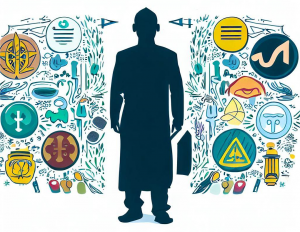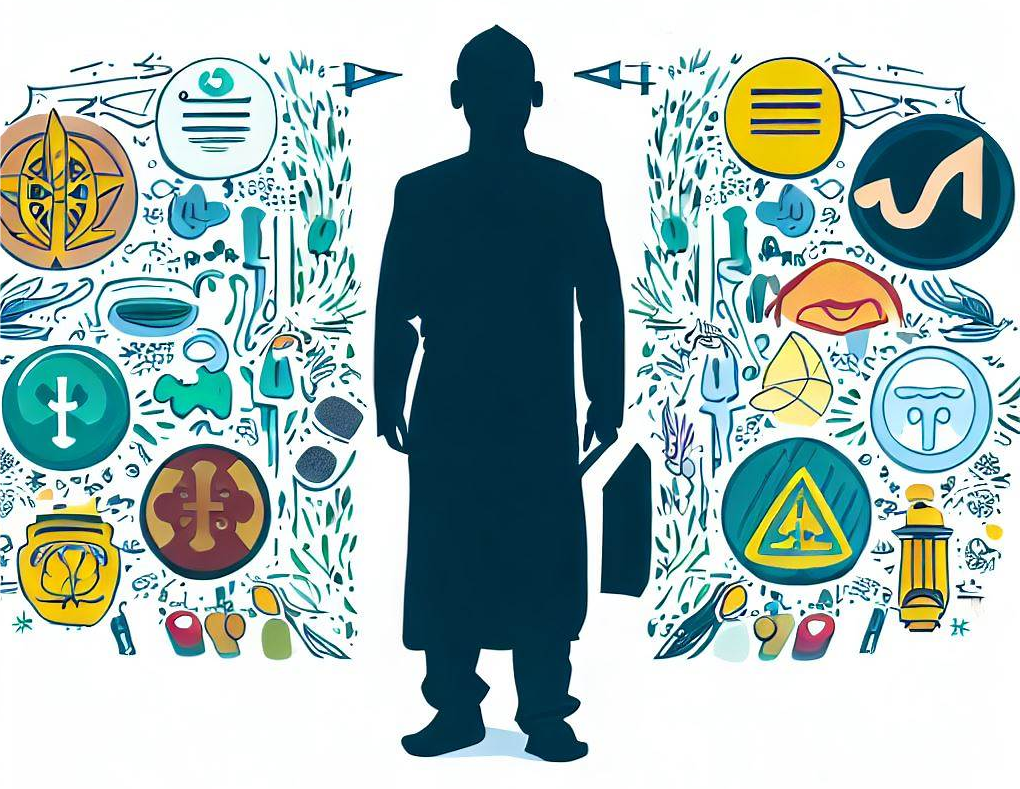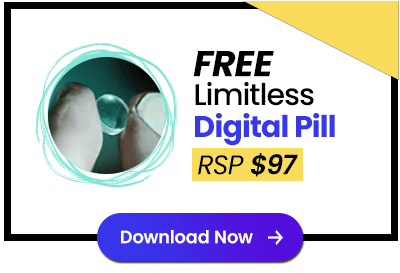Do you ever feel like traditional medicine isn’t giving you the results you need for your health concerns? If so, alternative medicine practices might be worth exploring. These practices encompass a wide range of methods such as herbs, supplements, mindfulness practices, and alternative therapies to provide holistic approaches to healing and overall well-being.
While there are potential benefits to these practices, it is important to understand their risks as well. Alternative medicine practices offer a natural approach to health that focuses on treating the whole person rather than just symptoms. By incorporating these methods into your daily routine, you may find relief from physical and mental ailments while promoting overall wellness.
However, it is crucial to note that not all alternative medicine practices have been scientifically validated and some may even pose risks if not used properly. In this article, we will explore both the potential benefits and risks of alternative medicine practices so that you can make informed decisions about your personal health journey.
The Potential Benefits of Alternative Medicine Practices
 The potential advantages of exploring non-traditional healing methods abound and are worth considering in the pursuit of holistic well-being.
The potential advantages of exploring non-traditional healing methods abound and are worth considering in the pursuit of holistic well-being.
Natural remedies, for instance, can be a great alternative to traditional medicine. These remedies come in various forms such as herbs, teas, essential oils, and supplements. They’re believed to offer numerous benefits such as reduced inflammation, improved digestion, and immune function.
Holistic healing techniques are also gaining popularity due to their ability to treat not just physical ailments but also emotional and mental ones. Techniques like acupuncture, chiropractic care, meditation, and yoga are known to help manage stress levels while promoting relaxation and inner peace. They have been shown to improve sleep quality, reduce anxiety, and depression symptoms.
Aside from being natural and less invasive than conventional treatments, alternative medicine practices often focus on treating the root cause of an illness rather than just managing its symptoms. This approach allows patients to take charge of their own health by making lifestyle changes that promote overall wellness.
While these practices may not be suitable for everyone or every condition, they can certainly complement traditional medical treatment plans when used appropriately.
Boosting Immune System Function with Herbs and Supplements
Looking for a natural way to boost your immune system? Check out these herbal remedies and natural supplements for immunity.
Certain herbs, such as echinacea and elderberry, have been shown to help prevent or shorten the duration of colds and flu by enhancing immune function. Echinacea works by stimulating white blood cell activity, while elderberry contains compounds that inhibit viral replication.
In addition to herbs, there are several vitamins and minerals that can support immune health. Vitamin C is an antioxidant that helps protect against oxidative stress and supports the production of white blood cells. Zinc is another mineral that plays a role in immune function, as it helps activate T-cells which fight off infection.
You can find these nutrients in various forms such as capsules or chewable tablets. While these supplements may offer some benefits for boosting your immune system, it’s important to remember that they should not replace medical treatment or advice from your healthcare provider.
Additionally, some herbs and supplements may interact with medications you’re taking or have side effects on their own. Always consult with a qualified healthcare practitioner before starting any new supplement regimen. By doing so, you can ensure you are using them safely and effectively to support your overall health and well-being.
Mindfulness Practices for Improved Mental Health
Incorporating mindfulness exercises into your daily routine can be a beneficial practice for improving your mental health.
Mindfulness is the act of being present and aware in the moment, without judgment or distraction. It involves paying attention to your thoughts, emotions, and physical sensations with a sense of curiosity and openness.
Practicing mindfulness can help you reduce stress levels and improve overall well-being. Stress reduction techniques such as deep breathing exercises and meditation can help you manage anxiety and depression symptoms by calming the mind-body connection.
Mindfulness also promotes self-awareness, which helps you identify negative thought patterns that may be contributing to mental health issues.
It’s important to note that while mindfulness practices are generally safe for most people, they should not replace professional medical care for serious mental health conditions.
However, incorporating mindfulness into your daily routine can provide numerous benefits for improved mental health, including increased self-awareness, reduced stress levels, and better emotional regulation.
Alternative Therapies for Pain Relief
If you’re seeking relief from pain, exploring alternative therapies like acupuncture and massage can be a soothing and rejuvenating experience.
Acupuncture is based on the ancient Chinese practice of inserting thin needles into specific points on the body to stimulate energy flow. Studies have shown that acupuncture can be effective in alleviating chronic pain, including back pain, neck pain, and osteoarthritis.
Additionally, herbal remedies such as turmeric and ginger are known for their anti-inflammatory properties which make them ideal for managing various types of pains.
Massage therapy is another alternative therapy that has been proven to be effective in relieving pain. It involves manipulating soft tissues in the body using hands or devices such as rollers and electric massagers. Massage therapy helps to improve blood circulation, reduce muscle tension, and relieve stress which ultimately reduces overall discomfort caused by pain.
Research has also indicated that massage therapy can help alleviate chronic lower back pain when combined with other treatments.
It’s important to note that while alternative therapies may provide relief from physical discomforts, they may not work for everyone or every type of ailment. Before trying any form of alternative therapy, it’s crucial to consult with a healthcare professional who can evaluate your condition and recommend safe treatment options tailored specifically to your needs.
Understanding the Risks of Alternative Medicine Practices
You may be surprised to learn that some alternative therapies you’ve heard of can pose significant dangers to your physical well-being.
While there are regulations in place for conventional medicine, the same cannot be said for alternative medicine. This means that not all alternative therapies have been scientifically tested and their safety and effectiveness cannot always be guaranteed.
One example of a risk associated with alternative medicine is the use of certain therapies in cancer treatment. Some people turn to alternative treatments such as herbal remedies or special diets instead of undergoing traditional cancer treatments like chemotherapy or radiation.
However, these unproven methods can actually harm patients by delaying effective treatment or interfering with prescribed medication.
Another potential risk of alternative medicine practices is the lack of standardization and quality control. Unlike pharmaceuticals, herbs and supplements are not regulated by the FDA in the same way which means they may contain harmful substances or vary widely in strength from one product to another.
It’s important to research any supplement before using it and consult with a healthcare professional who is knowledgeable about both conventional and alternative treatments when making decisions about your health.
What is the difference between alternative medicine and conventional medicine?
When it comes to healthcare, there are two main approaches: conventional medicine and alternative medicine.
Key differences between the two include their philosophies and methods of treatment. Conventional medicine relies heavily on pharmaceuticals, surgeries, and other scientific interventions to treat illnesses and diseases.
Alternative medicine, on the other hand, uses natural remedies such as herbs, acupuncture, and meditation to promote healing in the body.
Pros of conventional medicine include its ability to provide fast relief for acute conditions and its reliance on scientific evidence. However, it can also be expensive and may have negative side effects.
Alternative medicine is often more affordable and less invasive but may not be backed by as much scientific research or regulatory oversight.
Ultimately, choosing between these two approaches requires careful consideration of your personal health needs and beliefs about healthcare.
Are alternative medicine practices regulated by the government?
Hey there! Did you know that alternative medicine practices aren’t regulated by the government?
This means that consumers must be extra cautious when seeking out these types of treatments. While some alternative therapies may offer benefits, without proper regulation and oversight, there’s a risk of harm to the consumer.
It’s important to do your own research and consult with a qualified healthcare professional before trying any alternative medicine practices for personal health. Remember, your safety should always come first!
How do alternative medicine practices interact with prescription medications?
When it comes to alternative medicine practices, it’s important to be aware of potential drug interactions with prescription medications.
Always communicate with your healthcare provider about any alternative remedies you’re considering using, as they may interact with other medications you’re taking.
Some alternative treatments can also have side effects that could negatively impact your health.
By staying informed and talking openly with your healthcare team, you can make the best decisions for your personal health and well-being.
Can alternative medicine practices be harmful to certain individuals or populations?
You should be aware of the potential dangers and ethical considerations involved in alternative medicine practices.
Some individuals or populations may have pre-existing conditions that could be negatively affected by certain practices, while others may experience adverse reactions to herbal supplements or other treatments.
It’s important to consult with a healthcare professional before attempting any new alternative therapies, as they can provide guidance on whether it’s safe and appropriate for your individual needs.
Additionally, there are ethical concerns surrounding some alternative medicine practices, such as cultural appropriation or exploitation of vulnerable populations.
By staying informed and cautious, you can make informed decisions about your personal health journey while avoiding any potential harm or unethical behavior.
Are there any scientific studies that support the effectiveness of alternative medicine practices?
You may be wondering if there are any scientific studies that support the potential benefits or potential risks of alternative medicine practices. The answer is yes, there’ve been numerous studies conducted on various forms of alternative medicine such as acupuncture, herbal supplements, and meditation.
While some studies have shown promising results for certain conditions, it’s important to note that not all alternative medicine practices are backed by solid evidence and some may even pose potential risks. It’s crucial to speak with a healthcare professional before trying any alternative medicine practice to ensure it’s safe for you and won’t interfere with any other treatments you may be receiving.
Exploring alternative medicine practices can offer many potential benefits for your personal health. From boosting your immune system function with herbs and supplements to improving your mental well-being through mindfulness practices, there are various methods to enhance your overall wellness.
Additionally, alternative therapies such as acupuncture or massage can offer pain relief without the use of medication. However, it’s important to understand that there are also risks associated with alternative medicine practices.
It’s crucial to research any treatment thoroughly and consult with a healthcare professional before trying it out. Remember, you can’t judge a book by its cover. Just because something appears natural or holistic doesn’t necessarily mean it’s safe or effective.
By approaching alternative medicine practices with an open mind and careful consideration, you can make informed decisions about what’s best for your personal health journey.









